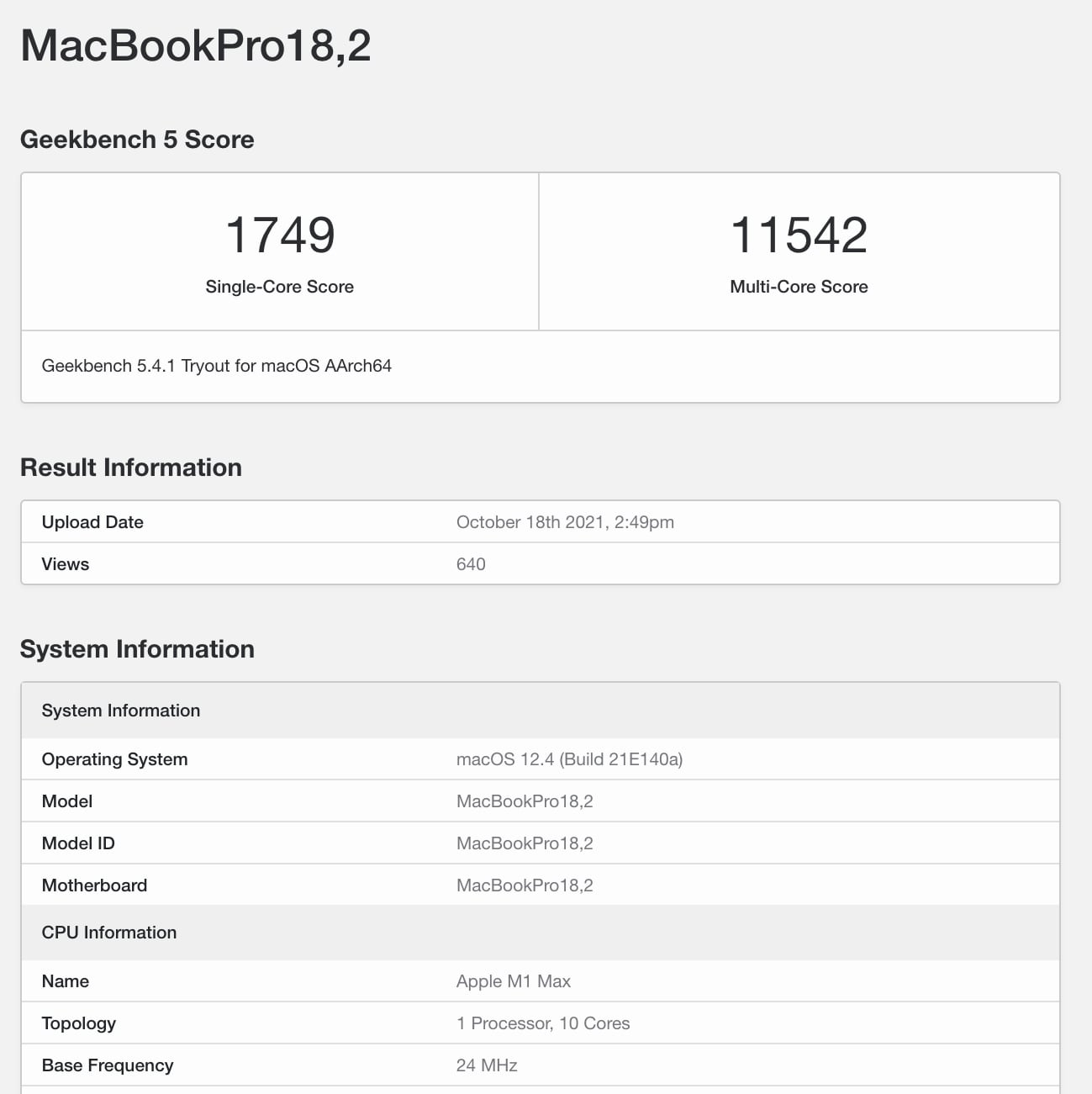Apple's M1 Max SoC Allegedly Makes Shaky Geekbench Debut
The M1 Max is Apple's most powerful MacBook Pro processor.
Just hours after Apple announced its new MacBook Pros featuring M1 Pro and M1 Max CPUs, the first benchmarks showed up online this afternoon. As is typically the case for unreleased products, the benchmarks appeared in the Geekbench database. According to the result, this is a 10-core M1X Pro with 32GB of on-package memory.
The M1 Max managed to post a single-core score of 1,749 and a multi-core score of 11,542. To put those numbers in perspective, the 13-inch MacBook Pro (M1) that we tested late last year delivered single- and multi-core scores of 1,733 and 7,584, respectively. The single-score score is not exactly earth-shattering, and the multi-core scores seem suspect as well, given that the number of performance cores doubled from four to eight compared to the M1.

We must say that we're a little disappointed that there isn't a larger jump in performance, especially given the price tag of the M1 Max-equipped MacBook Pros. A 13-inch MacBook Pro starts at $1,299, while the "cheapest" 14-inch MacBook Pro with an M1 Max (10-core GPU, 32-core GPU) costs $3,099.
However, there are a few caveats to mention regarding the stated performance numbers. For starters, the benchmarks were run on a pre-release version of macOS Monterey (21E140a), and the CPU reports a base clock of 24MHz. That last point could be attributed to Geekbench not correctly identifying the clock speed of the new M1 Max.
The first all-new 14- and 16-inch MacBook Pros will ship on October 25th, which means that we're bound to see even more benchmark results appear during the next week. We'll also be eager to see real-world GPU performance of the M1 Pro and M1 Max, as this is where Apple has promised some significant gains in performance compared to previous generations (and Intel-based competitors).
Get Tom's Hardware's best news and in-depth reviews, straight to your inbox.

Brandon Hill is a senior editor at Tom's Hardware. He has written about PC and Mac tech since the late 1990s with bylines at AnandTech, DailyTech, and Hot Hardware. When he is not consuming copious amounts of tech news, he can be found enjoying the NC mountains or the beach with his wife and two sons.
-
jridder Hmmm, I don't know about trusting these numbers. The build numbers for macOS seem a little suspicious. Build 21A558 was released to developers today and it's supposed to be RC. The build on this bench says 21E140a. Something is off.Reply -
hotaru251 Could be soemthing unexpected (or a bad sample)Reply
either that or M1 chip does not properly scale. -
JamesJones44 This could also be the bottom end 6 performance 2 efficiency version found in the bottom end 13" MBP and being miss reported as 10 core. The single thread score still looks shaky with that, but the multi core score would make sense in that scenario. Definitely a take with a grain of salt result.Reply -
joneskind Alright guys, I did the math.Reply
Be A a performance core and B an efficiency core.
We know from the M1 benches that 4A + 4B = 7590
The allegedly M1 Max benches says that 8A + 2B = 11542
If the second statement is true :
2 x (8A + 2B) = 23084
12B = 23064 - 7590 = 15894
B = 1291
A = 606
Which means that a performance core is a little more than twice as powerful as the efficiency one.
It seems consistent with Apple's description of the M1 -
joneskind Replyhotaru251 said:either that or M1 chip does not properly scale.
Apps running on M1 chips can use both the efficiency cores and the performance cores at the same time. So do Geekbench.
The M1 is a 8 cores chip (4-4) while the M1 Max is a 10 cores chip (8-2)
Those benches seems fairly consistent to me, without having to invoke scalability problems.
I did the math in a comment above -
joneskind Some new benches pop up, with better scoresReply
https://browser.geekbench.com/v5/cpu/search?q=Apple+M1+Max
12693 for the best one -
bkkcanuck8 Take all them with a grain of salt (some of them made no sense i.e. version 12.4 build number out of whack... but any case any or all of them can be spoofed). That being said, I had guestimated 12750 approximately (probably a rough calculation based on change in configuration of cores and e-cores running around 70% as powerful as e-cores (when all cores used) and of course a slight penalty for all cores - per core speed.... So 12,693 seems reasonable to me (11,750ish seemed off - and I would have been disappointed).Reply -
bkkcanuck8 Replyjoneskind said:Alright guys, I did the math.
Be A a performance core and B an efficiency core.
We know from the M1 benches that 4A + 4B = 7590
The allegedly M1 Max benches says that 8A + 2B = 11542If the second statement is true :
2 x (8A + 2B) = 23084
12B = 23064 - 7590 = 15894
B = 1291
A = 606
Which means that a performance core is a little more than twice as powerful as the efficiency one.
It seems consistent with Apple's description of the M1
I vaguely remember hearing that e-cores are about 70% as powerful as a p-core... but when you run all p-cores, they won't run the same performance as a single p-core, and the average of 4 p-cores is not going to be the same as the average of 8 p-cores.
That said, I was expecting around 12,750ish.... I was hoping I was underestimating but it seems reasonable. 11,750 sounds low. I don't know if any of these are from real runs though. -
bkkcanuck8 My bad, I actually under estimated the improvement... I found my response on a youtube video.... (it was made when it was expected to be an 8/4 mix). It is beginning to look like it is around 12,750 (about 3,000 more than your top of the line gaming laptop). GPU is a bit of a outstanding question (geekbench does a compute benchmark not necessarily a video based benchmark).Reply
"I expect the CPU portion of M1X to max out at 11,750 on Geekbench (about 58% more performance) (probably a bit less maybe 50%). The calculation I used takes what I believe is the performance profile for an efficiency core of 70% of the performance core. Assuming that - without taking any thermal throttling down on adding 4 more performance cores (likely there will be some) would give the Geekbench score of 11,750. 4 + x40.70 = 7399; then x = 1088; therefore x8 + x40.70 = 11,750 or around 58%... though that is likely higher due to clock speed of performance of all core execution dropping some amount] "